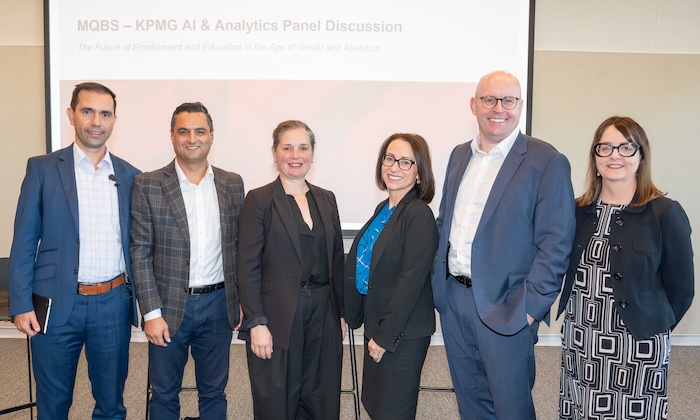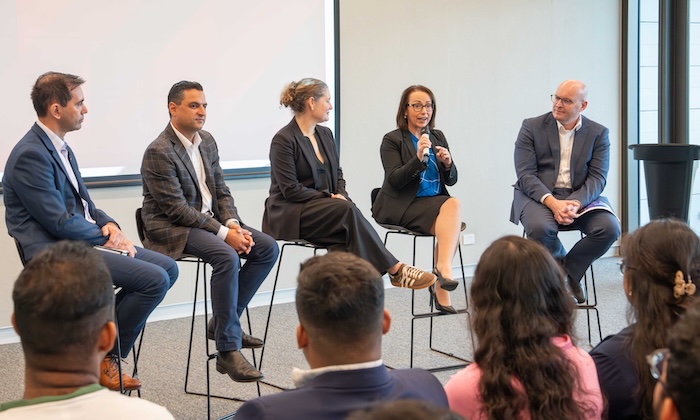Bridging AI, analytics and humanity
Macquarie Business School, with KPMG, hosted a powerful discussion on The Future of Employment and Education in the Age of GenAI and Analytics.

Organised by the Macquarie University Business Analytics Club (MUBAC) and Professor Babak Abedin, Head of the Department of Actuarial Studies and Business Analytics, the event featured insights from leading industry professionals, academics, and students, all focused on preparing graduates for a rapidly evolving digital landscape.
Balancing soft and hard skills
It was a full house at the event, which opened with an address by MUBAC student leader Michael Lee, who reflected on the dual demands facing analytics students.
“There’s an ongoing tension between the hard skills such as Python, SQL, and Power BI, and the soft skills we’re constantly reminded to strengthen like communication, resilience and critical thinking. It’s not always an easy balance to strike,” he said.
“Nonetheless, we see enormous opportunities ahead — to use our skills not just for efficiency or profit, but for impact. At Macquarie Business School, we’re fortunate to be doing that in an environment that not only responds to change but anticipates and drives it.”
Professor Leonie Tickle, Executive Dean of Macquarie Business School, echoed this need for balance, observing that the rise of generative AI is “completely reshaping industries, redefining skillsets and transforming how organisations work.”
Professor Tickle highlighted that students today will have twice as many jobs over their careers compared to those 15 years ago, and that universities have an important role in preparing them for this.
“Our school’s mission is to empower students to drive meaningful change throughout their careers, not just adapt to transformation, but actively shape it,” she explained. “Events like today, help equip you for the future.”
Learning never stops
Professor Babak Abedin highlighted the applied, future-focused nature of business analytics programs at Macquarie Business School, emphasising the importance of continuous engagement with industry professionals, particularly in the era of Generative AI.
He noted that this ongoing dialogue enables students, academics and university partners to not only adapt to technological change, but also to harness it for enhanced learning and career development. He then introduced KPMG's esteemed panel to bring real-world industry perspective to the discussion.
Shahab Dayani, Head of Data and AI, Enterprise Audit and Assurance at KPMG, shared how his career pivoted significantly alongside technological evolution.
“AI didn’t exist when I started at KPMG 15 years ago — we used Excel more smartly. Now, we’re working with generative AI daily. It’s revolutionised how we serve clients,” he explained.
John Munnelly, Chief Digital Officer at KPMG, explained that generative AI is now so important to the business that everyone in the organisation is offered training.
“On your first day at KPMG you get a laptop and a session on generative AI,” he said.
“We have a program that does digital badges – the first one is ‘Trust in AI’, the second is ‘What is AI?’ and the third is ‘How to Prompt’. Currently, about 60 per cent of employees at KPMG have gone through that.”
Is AI a threat to jobs?
The panel agreed that the threat of AI to jobs is a common concern, and, in some cases, with good reason.
John spoke candidly about the disruption caused by generative AI tools like ChatGPT.
“When ChatGPT launched in November 2022 it was scary. It was really good at writing code. 2023 was all about chat and the chat tools; 2024 we started to build agents. We're now building tools that don’t just answer questions — they take action, analyse data, and learn as they go. That changes everything. We now have a tax tool with a 100-page prompt that will do in an hour what took people two weeks to do. This is the sort of work that would have been done by grads, but is now done through tools.”
Julie Cleary, Partner in Charge, Enterprise Audit and Assurance at KPMG, emphasised the importance of hard and soft skills, and warned about roles lacking the need for soft skills.
“Humans need humans, so soft skills are critical – for instance when working together as a team,” she said. “However, if you are working full-time from home, I can guarantee that’s a role that could be replaced by AI in the future.”
This was a sentiment echoed by Shahab, who explained that what is becoming more desirable in the workforce are those who have technical skill sets and are also subject matter experts.
“People who know how to use AI can replace you, but AI alone cannot replace you,” he said. “You need to have a round skill set that includes people skills.”
Responsible AI is a non-negotiable
Jessica Wyndham, KPMG’s Trusted AI Lead, gave a compelling overview of the importance of ‘Responsible AI’.
“Responsible AI is about using these tools ethically, transparently, and in a way that empowers people, not harms them,” she explained.
She highlighted real-world consequences of AI misuse, citing Australian companies fined for breaching privacy laws and using deceptive algorithms.
Graduates today have unprecedented power
While there are advantages and disadvantages with generative AI, Julie emphasised the power students have coming through university at this time.
“You are entering the workforce with a skill set that 80 per cent of people in the industry don’t have — and desperately need. I’m really excited to see this class out in the workforce.”
The panellists urged students to be proactive, adaptable, and vocal. “The most exciting ideas often come from the most junior voices,” Shahab said. “Come into the room and tell us what we’re doing wrong — that’s what we need from you.”
The session closed with a strong message of optimism. Jessica reminded students: “You’re the first generation entering the workforce with access to these tools from the start. You have the chance to use AI not just efficiently, but responsibly — to shape a better, more inclusive world.